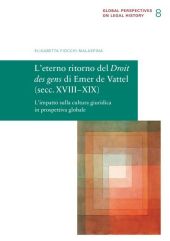 Neuerscheinungen 2017Stand: 2020-02-01 |
Schnellsuche
ISBN/Stichwort/Autor
|
Herderstraße 10
10625 Berlin
Tel.: 030 315 714 16
Fax 030 315 714 14
info@buchspektrum.de |

Elisabetta Fiocchi Malaspina
L´eterno ritorno del Droit des gens di Emer de Vattel (secc. XVIII-XIX)
L´impatto sulla cultura giuridica in prospettiva globale
3. Aufl. 2017. 368 S. 210 mm
Verlag/Jahr: EPUBLI 2017
ISBN: 3-944773-07-1 (3944773071)
Neue ISBN: 978-3-944773-07-0 (9783944773070)
Preis und Lieferzeit: Bitte klicken
This book investigates the global impact of Emer de Vattel´s juridical-political work Droit des gens.
The numerous editions and early translations produced throughout the eighteenth century enabled the broad dissemination of Emer de Vattel´s juridical-political work Droit des gens. This book investigates the global impact of the Droit des gens with regard to the different political realities, the historical and legal contexts as well as the attempts, mechanisms and strategies used to put these ideas into practice and establish new doctrine between the eighteenth and nineteenth centuries.
Fiocchi Malaspina, Elisabetta
Elisabetta Fiocchi Malaspina is Assistant Professor of Legal History at the Law Faculty of the University of Zurich (Switzerland). She received her MA in Law at the University of Milan and her PhD in Legal History at the University of Genoa (Italy). Moreover, she was awarded several research grants from the Max Planck Institute for European Legal History (Frankfurt am Main, Germany); was visiting research fellow at the Erik Castrén Institute of International Law and Human Rights at the Law Faculty of the University of Helsinki (Finland); and participated in the Law and Public Affairs Discussion Group at the Law Faculty of the University of Oxford (England) during a research stay. Her main research fields include history of international law, circulation and diffusion of natural law and law of nations theories between the 18th and 19th centuries, history of water law, history of land ownership and land registration (19th and 20th centuries).


